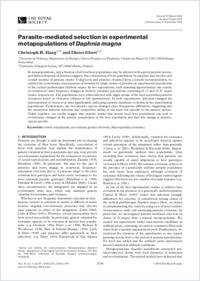Parasite-mediated selection in experimental metapopulations of Daphnia magna
- Haag, Christoph R. Tvärminne Zoological Station, Finland
- Ebert, Dieter Ecology and Evolution, Department of Biology, University of Fribourg, Switzerland
-
22.09.2004
Published in:
- Proceedings of the Royal Society of London: Biological Sciences. - 2004, vol. 271, no. 1553, p. 2149-2155
English
In metapopulations, only a fraction of all local host populations may be infected with a given parasite species, and limited dispersal of parasites suggests that colonization of host populations by parasites may involve only a small number of parasite strains. Using hosts and parasites obtained from a natural metapopulation, we studied the evolutionary consequences of invasion by single strains of parasites in experimental populations of the cyclical parthenogen Daphnia magna. In two experiments, each spanning approximately one season, we monitored clone frequency changes in outdoor container populations consisting of 13 and 19 D. magna clones, respectively. The populations were either infected with single strains of the microsporidian parasites Octosporea bayeri or Ordospora colligata or left unparasitized. In both experiments, infection changed the representation of clones over time significantly, indicating parasite-mediated evolution in the experimental populations. Furthermore, the two parasite species changed clone frequencies differently, suggesting that the interaction between infection and competitive ability of the hosts was specific to the parasite species. Taken together, our results suggest that parasite strains that invade local host populations can lead to evolutionary changes in the genetic composition of the host population and that this change is parasite-species specific.
- Faculty
- Faculté des sciences et de médecine
- Department
- Département de Biologie
- Language
-
- English
- Classification
- Ecology and biodeversity
- License
-
License undefined
- Identifiers
-
- RERO DOC 4116
- DOI 10.1098/rspb.2004.2841
- Persistent URL
- https://folia.unifr.ch/unifr/documents/299586
Statistics
Document views: 265
File downloads:
- Texte intégral: 234
